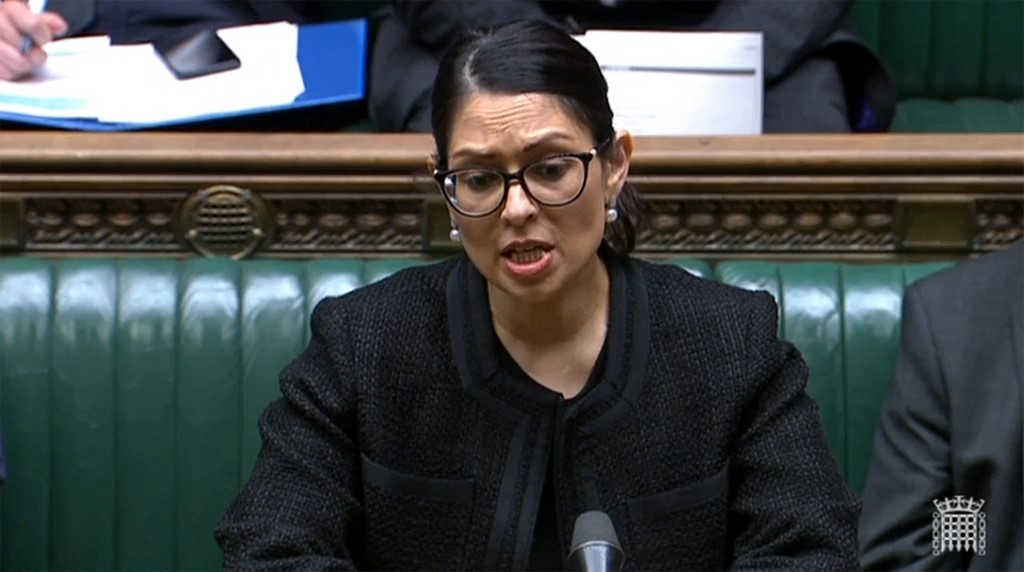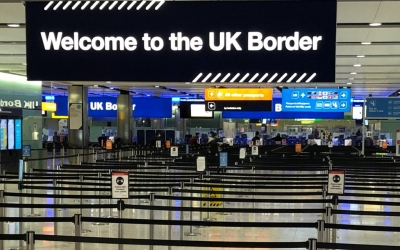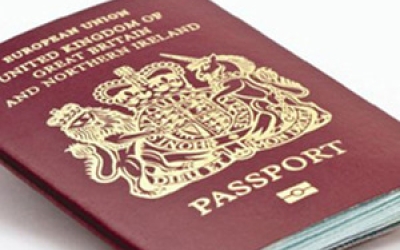UK government seeking new powers to remove citizenship without notice

A new clause added by the UK government to a proposed new nationality and borders bill would give the government the power to strip people of their British citizenship without giving them notice.
The clause, titled the "Notice of decision to deprive a person of citizenship", exempts the government from having to give notice if it is not "reasonably practicable" to do so, or if stripping citizenship is in the interests of national security and diplomatic relations.
The proposed change to the current law is sponsored by Home Secretary Priti Patel. The bill is currently proceeding through the House of Commons but has yet to be considered by the upper house of the UK parliament, the House of Lords, which can propose amendments to legislation.
"British citizenship is a privilege, not a right. Deprivation of citizenship on conducive grounds is rightly reserved for those who pose a threat to the UK or whose conduct involves very high harm," a Home Office spokesperson told Middle East Eye.
"The Bill doesn't extend our power to remove citizenship. The requirement to give notice of a decision to deprive citizenship will be disapplied where it is not practicable to do so."
In 2002, the UK introduced measures that allowed British-born nationals and naturalised citizens to lose their nationality rights. Successive governments gradually broadened the scope of those powers.
The government's use of the powers then rose in response to the perceived threat posed by British nationals returning from Syria.
Out of 172 people deprived of citizenship between 2010 and 2018, 104 of those cases occurred in 2017, according to Home Office figures.
The UK and citizenship-stripping powers
+ Show - HideThe UK has been described by researchers as a “global leader in using citizenship deprivation as a counterterrorism measure”.
Historic citizenship-stripping powers targeted at naturalised citizens on disloyalty grounds had largely fallen into disuse prior to 2002, when the government introduced new measures in an attempt to revoke the citizenship of Abu Hamza, an Egyptian-born cleric subsequently convicted of terrorism in the US.
The 2002 legislation allowed for British-born nationals as well as naturalised citizens to lose their nationality rights. Successive governments gradually broadened the scope of the powers so that home secretaries can now deprive anyone of citizenship if they are satisfied that doing so is “conducive to the public good” and would not leave an individual stateless.
No criminal conviction is required. Letters often state that individuals have been assessed as presenting “a risk to the national security of the United Kingdom”.
The government’s use of the powers surged to unprecedented levels in response to the perceived threat posed by British nationals returning from Syria.
Between 2010 and 2015, 33 people were stripped of their citizenship, according to Home Office figures. In 2016, 14 people were deprived, and in 2017 the number jumped to 104.
In 2018, the figure was 21, and in in 2019 - when Shamima Begum was among those targeted - it was 27. It then dropped to ten in 2020 and eight in 2021.
Some subjects of citizenship-stripping orders argue that they have been left effectively stateless, because the government bases its assessment that they are dual nationals on a right of citizenship to a parent’s country of birth, even if they have never taken up that citizenship or even visited the country.
In some cases the Special Immigration Appeals Commission, which rules on citizenship cases, has agreed: it has ruled in favour of British nationals of Bangladeshi descent on the grounds that Bangladesh does not consider them citizens if they have not claimed Bangladeshi nationality before the age of 21.
Human rights organisations and lawyers have compared the powers to “medieval exile and banishment”. Critics also point out that the powers create a two-tier system in which only those deemed to be dual nationals are at risk of losing their British citizenship; a measure that discriminates against naturalised citizens, immigrants and their children.
Critics and civil liberties groups say removing citizenship is already a contentious power and scrapping the notice requirement would make the government's capacities even more draconian.
"Citizenship is the right to have rights, and stripping a person of citizenship can have life-changing and sometimes deadly consequences," said Emily Ramsden, a senior officer on migration and citizenship at Rights and Security International (RSI).
"Allowing the government to strip people of citizenship without even telling them would deepen the already Kafkaesque struggle of people deprived of citizenship – most of whom are likely from migrant communities – to protect their rights against abuses of power that are allowed to go unchecked by independent judges."
'Morally abhorrent policy'
The proposed change to the law comes after the High Court ruled against the government in a case brought by a woman, known as D4, detained in the al-Roj camp in northern Syria for the families of suspected Islamic State (IS) group fighters.
The court ruled that the UK government's decision to revoke her citizenship in December 2019 was "null and void" because she had not been notified of the decision until her lawyers asked the government to repatriate her in October 2020. She subsequently appealed the decision.
The new clause would remove the need to notify individuals that their citizenship has been revoked in a number of circumstances.
Other proposed rule changes in the bill have also attracted criticism. The current version of the bill would criminalise anyone arriving in the UK by an illegal route, and also criminalises anyone who seeks to save their lives.
On the other hand, it would give immunity to Border Force staff if people die in the English Channel during operations to push migrant boats out of British waters.
"The US government has condemned citizenship-stripping as a dangerous denial of responsibility for your own nationals. Ministers should listen to our closest security ally rather than doubling down on this deeply misguided and morally abhorrent policy," Maya Foa, the director of Reprieve, told the Guardian newspaper.
A Home Office spokesperson told MEE that the decision to deprive a person of citizenship "must be reasonable and proportionate", and that it would work "in accordance with international law".
It is illegal to revoke someone's citizenship if the measure would leave them stateless, meaning that those targeted must be dual nationals or legally entitled to claim citizenship of another country.
In 2019, the UK revoked the citizenship of Shamima Begum, the British woman who at 15 travelled to Syria to join IS.
Earlier this year, Middle East Eye reported on the case of a British man who was able to return to the UK after four years stranded abroad, after the government was found to have wrongly assessed that he was entitled to Bangladeshi citizenship.
Middle East Eye delivers independent and unrivalled coverage and analysis of the Middle East, North Africa and beyond. To learn more about republishing this content and the associated fees, please fill out this form. More about MEE can be found here.







